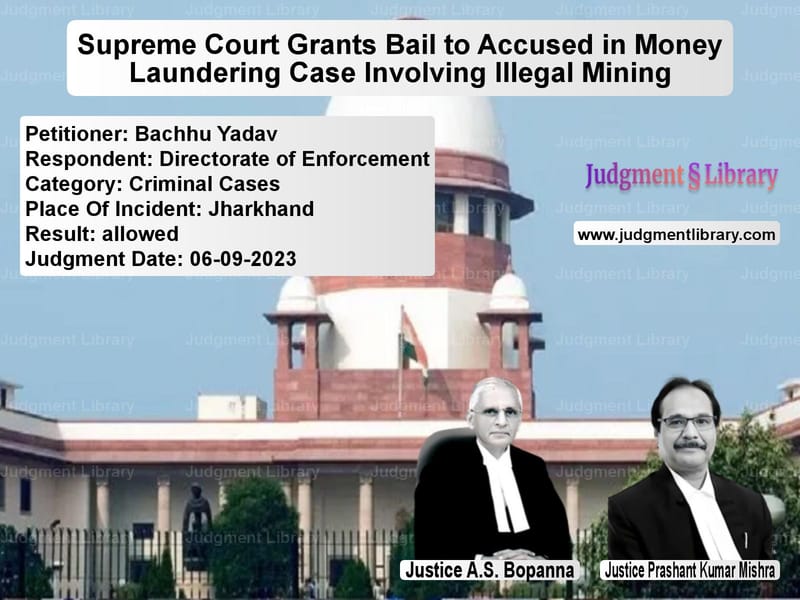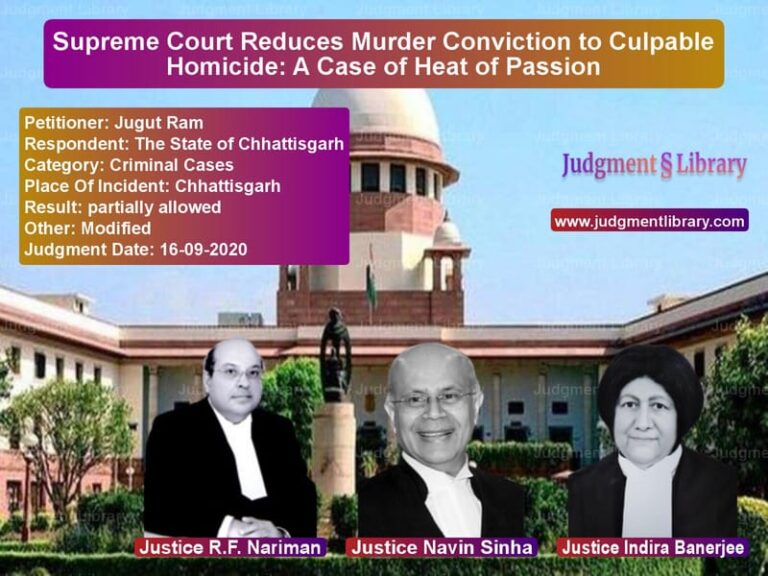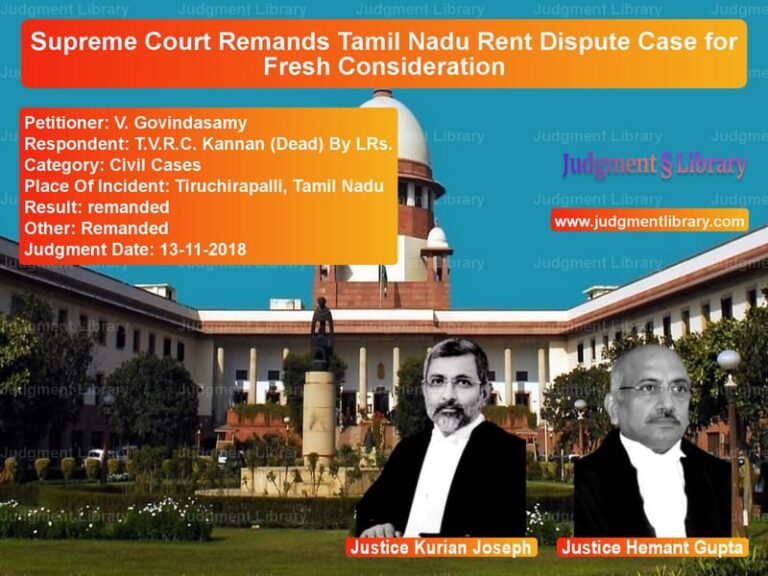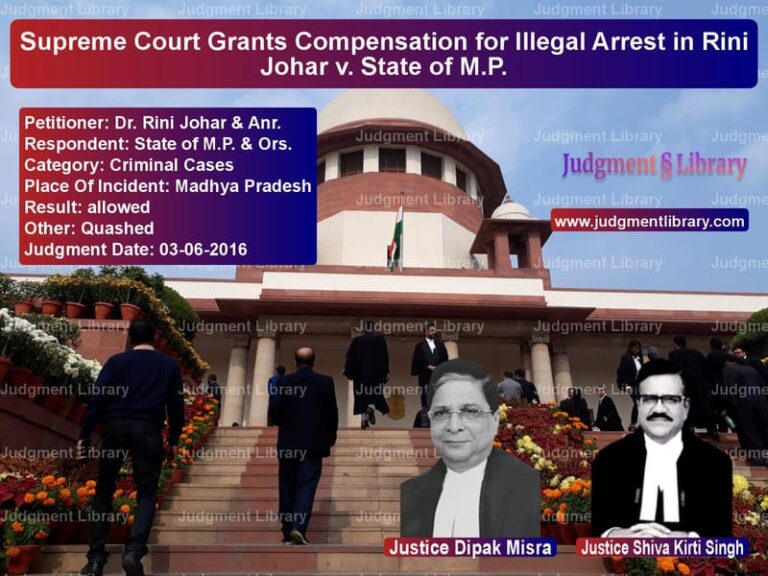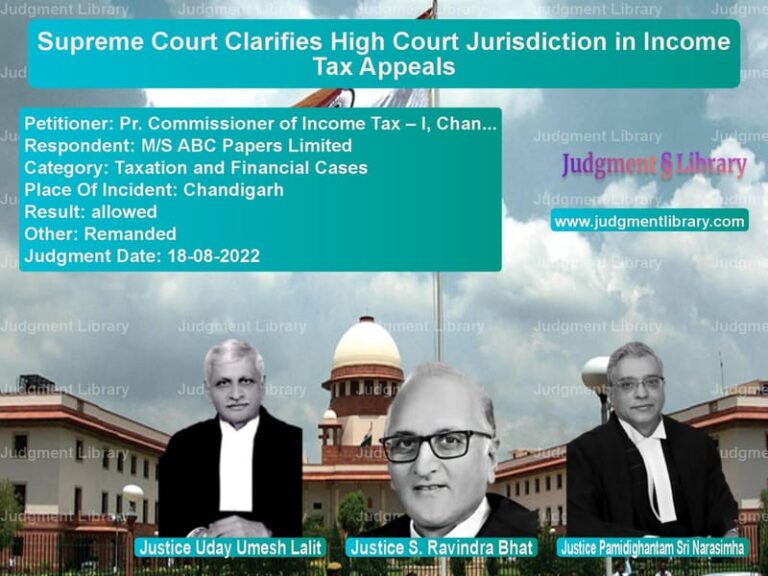Supreme Court Grants Bail to Accused in Money Laundering Case Involving Illegal Mining
The Supreme Court of India recently granted bail to an accused in a money laundering case linked to illegal mining in Jharkhand. The case, Bachhu Yadav v. Directorate of Enforcement, involved allegations under the Prevention of Money Laundering Act (PMLA), 2002, and centered around large-scale illegal transportation of stone chips. The Court, while granting bail, emphasized that prolonged incarceration without trial completion should be avoided and that strict bail conditions would ensure the accused’s presence during proceedings.
Background of the Case
The Enforcement Directorate (ED) had registered an Enforcement Case Information Report (ECIR) No. 04/2022 under Section 4 of the PMLA against the petitioner and other accused persons. The allegations against the petitioner, Bachhu Yadav, primarily related to the transportation of 1,844 trucks carrying stone chips between June 1, 2022, and June 26, 2022. Additionally, the ED claimed that an amount of Rs. 30 lakh, deposited in the petitioner’s bank account on January 24, 2022, was part of the proceeds of crime.
The High Court of Jharkhand, in its order dated March 21, 2023, rejected the petitioner’s bail application, citing the serious nature of the offense. Aggrieved by this decision, the petitioner approached the Supreme Court, seeking bail.
Legal Issues Before the Supreme Court
The Supreme Court examined the following key legal issues:
- Whether the petitioner’s alleged involvement in illegal mining and money laundering was sufficient to deny bail.
- Whether the Rs. 30 lakh deposit in the petitioner’s bank account constituted proceeds of crime.
- Whether continued incarceration was justified given the ongoing trial and the number of pending witnesses.
- Whether bail conditions could be imposed to prevent tampering with evidence.
Arguments by the Petitioner
The petitioner’s counsel contended:
- The alleged illegal activities took place between June 1, 2022, and June 26, 2022, whereas the bank deposit in question was made on January 24, 2022. Thus, the amount could not be classified as proceeds of crime.
- The petitioner was merely a transporter and not the mastermind behind the illegal mining operation.
- The main accused in the case, Pankaj Mishra, was denied bail earlier, but his role was far greater than that of the petitioner.
- The petitioner had already spent over a year in jail, and with 42 prosecution witnesses yet to be examined, the trial was unlikely to conclude soon.
- He had provided an explanation for the Rs. 30 lakh deposit, stating that it was meant for purchasing a property in Asansol.
Arguments by the Respondent (Enforcement Directorate)
The Enforcement Directorate, opposing bail, argued:
- The petitioner was a close associate of the main accused, Pankaj Mishra, who was involved in large-scale illegal mining.
- The Rs. 30 lakh deposit was part of a broader network of illicit financial transactions linked to illegal mining.
- The petitioner played a key role in the movement of illegally mined stone chips, and his release could hamper the ongoing investigation.
- Though the trial was progressing, the seriousness of the offense warranted continued detention.
Supreme Court’s Analysis
1. Bail Considerations in Money Laundering Cases
The Court recognized the stringent provisions of the PMLA, which mandate that bail can only be granted if:
- There is no reasonable ground to believe the accused is guilty.
- The accused is not likely to commit any offense while on bail.
The Court cited its earlier decision in Enforcement Directorate v. Kapil Wadhawan, emphasizing that economic offenses must be treated seriously but that each case must be assessed on its facts.
2. Analysis of the Rs. 30 Lakh Deposit
The Court found that the alleged illegal activities took place months after the disputed bank transaction. It stated:
“The amount was deposited on January 24, 2022, whereas the alleged illegal mining occurred between June 1, 2022, and June 26, 2022. The direct link between the transaction and proceeds of crime is not conclusively established at this stage.”
3. Prolonged Pre-Trial Incarceration
The Court observed that the petitioner had already spent over a year in custody, and given the number of pending witnesses, trial completion was uncertain. It noted:
“The petitioner was arrested on August 5, 2022, and has been in custody for over a year. The chargesheet has been filed, and trial has commenced, but with 42 witnesses yet to be examined, completion of trial is not foreseeable in the near future.”
4. Bail with Strict Conditions
The Court ruled that the petitioner could be released on bail subject to stringent conditions to ensure his presence at trial. It held:
“We direct that the petitioner be enlarged on bail subject to appropriate conditions imposed by the trial court. The petitioner shall diligently participate in the trial and shall not interfere with the course of justice.”
Supreme Court’s Judgment
The Supreme Court granted bail to the petitioner, subject to conditions imposed by the trial court. It directed that:
- The petitioner be released on bail immediately.
- He must attend all trial proceedings and not attempt to influence witnesses.
- He shall not engage in any activities related to illegal mining.
The petition was disposed of accordingly.
Implications of the Judgment
This ruling has significant implications for money laundering and economic offense cases:
- Balanced Approach to Bail: The judgment reinforces the principle that prolonged incarceration should not be used as a punitive measure.
- Distinction Between Accused Roles: The Court distinguished between key accused and peripheral players, setting a precedent for proportionality in granting bail.
- Importance of Trial Timelines: The ruling underscores the need for judicial oversight when trials are delayed.
Conclusion
The Supreme Court’s judgment in Bachhu Yadav v. Directorate of Enforcement marks a significant ruling in money laundering jurisprudence. By granting bail while ensuring accountability through strict conditions, the Court has upheld both individual liberty and the interests of justice. This case highlights the need for a careful balance between economic crime deterrence and the fundamental right to a speedy trial.
Petitioner Name: Bachhu Yadav.Respondent Name: Directorate of Enforcement.Judgment By: Justice A.S. Bopanna, Justice Prashant Kumar Mishra.Place Of Incident: Jharkhand.Judgment Date: 06-09-2023.
Don’t miss out on the full details! Download the complete judgment in PDF format below and gain valuable insights instantly!
Download Judgment: bachhu-yadav-vs-directorate-of-enfor-supreme-court-of-india-judgment-dated-06-09-2023.pdf
Directly Download Judgment: Directly download this Judgment
See all petitions in Money Laundering Cases
See all petitions in Fraud and Forgery
See all petitions in Judgment by A. S. Bopanna
See all petitions in Judgment by Prashant Kumar Mishra
See all petitions in allowed
See all petitions in supreme court of India judgments September 2023
See all petitions in 2023 judgments
See all posts in Criminal Cases Category
See all allowed petitions in Criminal Cases Category
See all Dismissed petitions in Criminal Cases Category
See all partially allowed petitions in Criminal Cases Category

